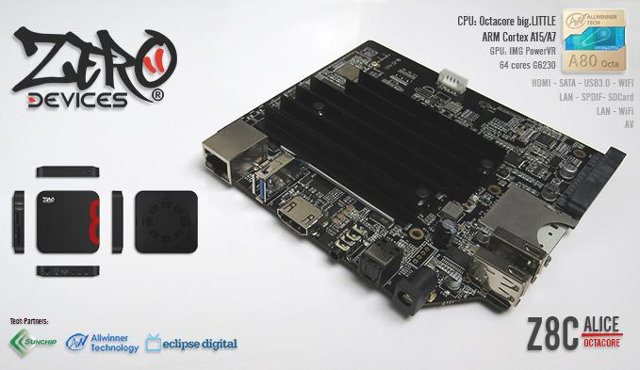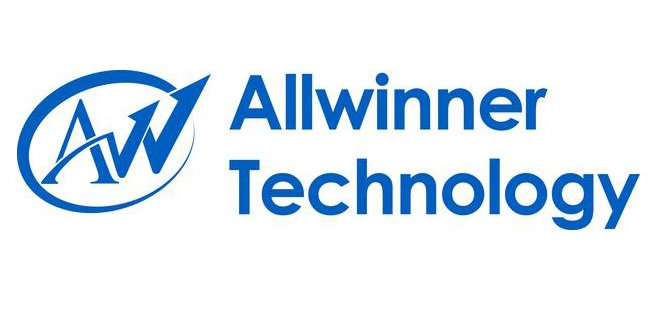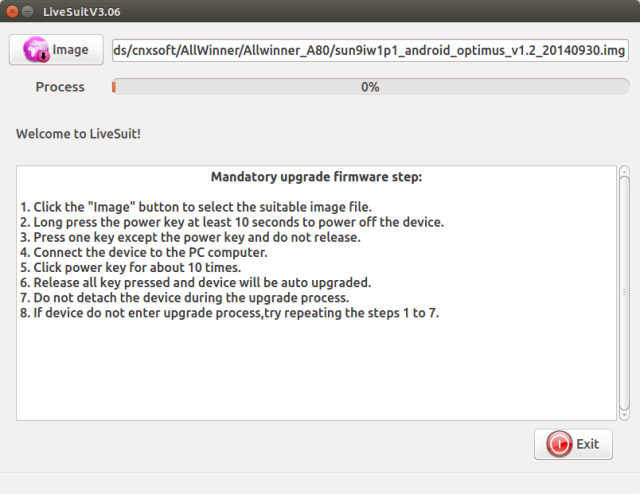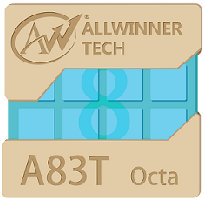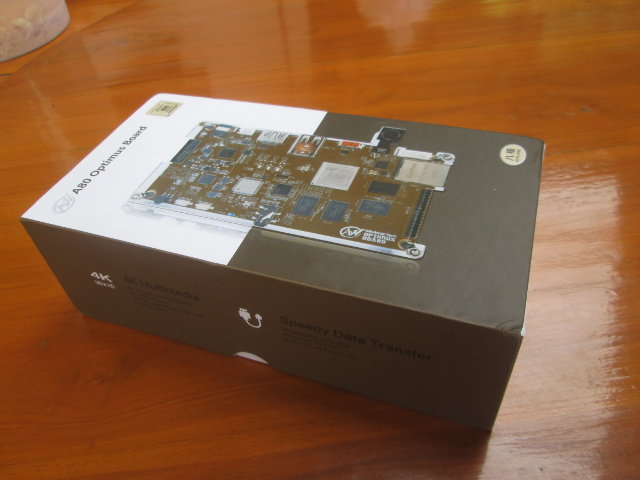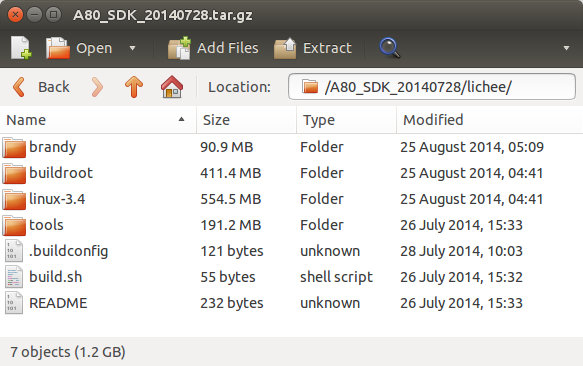Allwinner A80 based tablets such as Onda V989, and development boards such as A80 OptimusBoard started to ship one to two months ago, but there was absolutly no news about Android mini PCs / media player based on the latest Allwinner processor. This is about to change as ZeroDevices twitted about their Z8C Alice TV Box, apparently designed by Sunchip, and in collaboration with a UK based digital signage company called Eclipse Digital Media. Preliminary technical specifications that we can infer from the picture above: SoC – AllWinner Ultra Core A80 4x Cortex 15, 4x Cortex A7 big.LITTLE processor with Imagination Technologies PowerVR GC6230 GPU with support for OpenGL ES 1.1/2.0/3.0, Directx 9.3 System Memory – N/A Storage – ?? GB eMMC + SD card slot + SATA port (most probably via a USB 2.0/3.0 bridge) Video Output – HDMI + AV port Audio – HDMI, AV, and optical S/PDIF […]
Allwinner H8 Octa-core Processor is Designed for Game Consoles and OTT Boxes
Allwinner Technology has just introduced its new octa-core H8 System on Chip (SoC) for “high-end” gaming consoles and video OTT (over-the-top) boxes, right before the Hong Kong Electronics Fair taking place on October 13-16. The processor feature eight Cortex A7 cores clocked at up to 2.0 GHz, coupled with Imagination Technology PowerVR SGX544 GPU @ 700 MHz with support for OpenGL ES 2.0/1.1, OpenCL 1.1 APIs. Other key features includes: Multi-format 1080p@60fps video processing including H.265/HEVC codec. HDMI video output up to 1080P@60fps, with HDCP 2.0 support; support HDMI CEC Integrated 8M image signal processor USB – USB Host, and USB dual-role interfaces Gigabit Ethernet MAC Three SD/MMC controllers SmartColor technology to deliver higher image quality and better visual effects Manufactured with 28nm HPC (High-Performance Compact) process by TSMC. We don’t have the full details, but it does look very similar to Allwinner A83T announced last month, but except of […]
Linux 3.17 Released
Linus Torvalds announced the release of Linux Kernel 3.17 on Sunday: So the past week was fairly calm, and so I have no qualms about releasing 3.17 on the normal schedule (as opposed to the optimistic “maybe I can release it one week early” schedule that was not to be). However, I now have travel coming up – something I hoped to avoid when I was hoping for releasing early. Which means that while 3.17 is out, I’m not going to be merging stuff very actively next week, and the week after that is LinuxCon EU… What that means is that depending on how you want to see it, the 3.18 merge window will either be three weeks, or alternatively just have a rather slow start. I don’t mind getting pull requests starting now (in fact, I have a couple already pending in my inbox), but I likely won’t start processing […]
Current Performance and Stability Issues on AllWinner A80 OptimusBoard Development Board
Sine A80 OptimusBoard is the first ARM hardware that supports both USB 3.0 and Gigabit that I’ve ever owned, so I though it might be interesting to see what performance I could get with a USB 3.0 hard drive through the USB 3.0 OTG port of the board. For testing purpose, I bought a USB 3.0 OTG adapter on Ebay, but I did not look closely enough as it turned out to be only a USB 3.0 OTG to USB 2.0 female adapter capable of USB 2.0 speeds… Kind of useless item since you can plug a standard USB 2.0 OTG adapter into a USB 3.0 OTG receptacle. But I tried my hard drive anyway, and quickly realized write performance was very poor at 3 MB/s on the NTFS partition, whereas most other devices can handle at least15 MB/s, and usually over 25 MB/s. So I contacted Allwinner with this […]
How to Upgrade Allwinner A80 OptimusBoard Firmware
After informing Allwinner I had some rather slow write speed (3MB/s) to the NTFS partition of my USB drive on my A80 OptimusBoard, they kindly provided a new compressed Android firmware image (sun9iw1p1_android_optimus_v1.2_20140930.img.7z) with some NTFS optimizations that can be downloaded from baidu (password: x2tz), mega.co.nz or simos.info (please only use this link, if the other two do not work as it’s a private website and monthly bandwidth may be limited). I vaguely remember tools like LiveSuit (Linux) or PhoenixSuite (Windows), and I ended up on sunxi-linux Livesuit wiki as I’m running Ubuntu 14.04 on my PC, but you should be able to flash the firmware with PhoenixSuite if you run Windows. The instructions below can also be used for other Allwinner based devices. First you need to install LiveSuit, and build Allwinner USB drivers as follows:
|
1 2 3 4 5 6 7 8 |
sudo apt-get install dkms git build-essential git clone https://github.com/linux-sunxi/sunxi-livesuite.git cd sunxi-livesuite/awusb make sudo cp awusb.ko /lib/modules/`uname -r`/kernel/ sudo depmod -a sudo modprobe awusb cd.. |
In order to use LiveSuit as a normal user, you also have […]
AllWinner Announces A83T Octa Core Processor for Tablets
So Allwinner has just announced a new processor. I’ve been disappointed recently when I discovered AllWinner A80 only supports Linux 3.4, whereas most competitors are running Android 3.10 stable kernel, and their partner is distributing A80 OptimusBoard development boards, which looks to be a nice hardware platform, but without any Android or Linux SDK… And with their latest press release you have to wonder… They announced AllWinner A83T processor with “eight highly energy-efficient Cortex-A7 cores that could run simultaneously at around 2.0GHz, and implements the advanced big.LITTLE architecture to maximize the battery life”. The only problem is that with big.LITTLE you need big and LITTLE core, and if AllWinner A83T is just having eight Cortex A7 cores, there’s no big to be found… I guess that just means they can turn cores on and off independently… Allwinner must also have adopted Qualcomm or Mediatek press release “strategy”, as they release […]
A80 OptimusBoard Development Board Pictures and Benchmarks
A80 OptimusBoard is a development board featuring the latest AllWinner A80 SoC with 8 ARM Cortex A15/A7 cores in big.LITTLE configuration, and a PowerVR GC6230 GPU. Availability was announced about 2 weeks ago for $345, but partially thanks to reader comments on CNX Software, Merrii Technology decided to lower the price to $169 (and $50+ for shipping) to stay competitive against similar boards such as Hardkernel ODROID-XU3. I’ve now received a sample for evaluation. I won’t go again through the specs, but today I’ll take a few pictures of the board, and provide benchmark results to compare them to the ones I got with Rockchip RK3288. Normally, I would also play with the SDK provided with the board, but sadly (and amazingly), there’s currently no such SDK for A80 OptimusBoard, except a leaked Linux SDK which failed to build with recent tools and operating systems. A80 OptimusBoard Pictures I’ve received […]
AllWinner A80 Linux SDK Released
After Android 4.4 SDK for AllWinner A31 last week, another AllWinner software development kit has been seen in the wild, this time for the new AllWinner A80 octa-core processor. A80 SDK includes source code for the Linux Kernel and U-boot, as well as buildroot, and various AllWinner tools. I’ve also noticed AllWinner A80 datasheet is available, but with the strict minimum information (45 pages). Let’s get the code, and extract it:
|
1 2 3 |
wget http://dl.linux-sunxi.org/SDK/A80/A80_SDK_20140728.tar.gz tar xvf A80_SDK_20140728.tar.gz cd A80_SDK_20140728 |
Now we need to configure the build:
|
1 2 3 4 5 6 7 8 9 10 11 12 13 14 15 16 17 18 19 20 21 |
./build.sh config Welcome to mkscript setup progress All available chips: 0. sun9iw1p1 Choice: 0 All available platforms: 0. android 1. dragonboard 2. linux Choice: 2 All available kernel: 0. linux-3.4 Choice: 0 All available boards: 0. optimus 1. p1 2. perf 3. perf5 4. perf-lpddr3 Choice: 0 |
sun9i is the codename for AllWinner A80, not sure what w1p1 means. Dragonboard must be the internal Allwinner development board, but I just selected Linux, since the SDK does not come with Android, and finally I opted for optimus, which could stand for OptimusBoard. You may need to install extra dependencies in your build machine, for example (in Ubuntu 14.04):
|
1 |
sudo apt-get install flex texinfo build-essential |
Now let’s start buildroot which should retrieve the toolchain, […]


